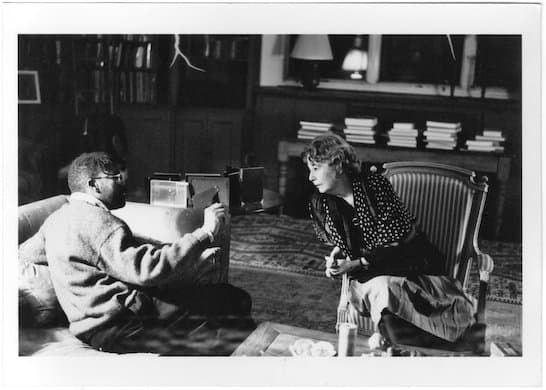Inside the Manhattan Literary Scene
Darryl Pinckney is the apprentice hero in the Pinocchio literary shop, an African American from Indianapolis who is guided to success by Elizabeth Hardwick, beginning with her Columbia University writing class.

‘Come Back in September: A Literary Education on West Sixty-Seventh Street, Manhattan’
By Darryl Pinckney
Farrar, Straus and Giroux, 432 pages
The novelist and essayist Elizabeth Hardwick, a founder of the New York Review of Books, is having her day. The long-suffering wife of mad poet Robert Lowell (she herself used the word to describe him) takes center stage in Cathy Curtis’s recent biography of her, as well as in Darryl Pinckney’s already celebrated memoir, which does double duty as a group biography.
What accounts for the success of this slight, if entertaining, book? Mr. Pinckney was “in the room” and takes us along with him in intimate, irresistible scenes. He is the apprentice hero in the Pinocchio literary shop of Manhattan, an African American from Indianapolis who is guided to success by Professor Hardwick, beginning with her Columbia University writing class.
Here is one of Mr. Pinckney’s big encounters: “[Susan] Sontag like Lowell before her, took up all the room. Professor Hardwick was far to her right, the side of the sofa where I’d never seen her sit.” Although Sontag deferred to the elder Hardwick as her master, she entered a room, as Sontag once said of Mary McCarthy, like an “aircraft carrier.”
The impressionable Mr. Pinckney rarely allows himself to upstage the likes of Barbara Epstein, another New York Review of Books founder, or any of the other literary lights who illuminate Hardwick’s very tightly drawn together coterie, which has no room for contenders like Lillian Hellman, whom Hardwick dispatches to purdah when Mr. Pinckney unwittingly mentions her.
Hardwick’s exclusive literary universe is revealed in this telling aside: “Several years in the future was Lizzie’s review of a biography of Edmund Wilson by one of those, to her, absurd professional biographers who had also written one of Lowell. The review was an occasion to knock biography and to do something with her long-held thoughts on Wilson.”
The ever careful Mr. Pinckney does not deign to say what he thinks of the unnamed biographer. In fact, Jeffrey Meyers received high praise, including from the late James Atlas (no stranger to the literary precincts of Manhattan), who had abandoned his own biography of Wilson.
Reviewers haven’t spent a second deploring Mr. Pinckney’s inside narrative, because Mr. Pinckney is an insider. So he can reconstruct dialogue that in a biography would invite attacks. One reviewer called Mr. Pinckney’s book “dishy,” and meant it as a good thing; my biography of Lillian Hellman was once called “dishy,” and that was a bad thing.
When I went to interview Agnes De Mille for my biography of Hellman, we discussed her biography of her friend Martha Graham. “I waited until she died,” De Mille said to me. “Sneaky, wasn’t I?” She smiled, relishing the fact. Reviewers of “Come Back in September” never use the “S” word.
Regardless of what Mr. Pinckney’s book actually amounts to, it is appealing for the behind-the-arras snooping his book purveys. He is not a professional biographer doing a deep dive and then getting on with another subject even as those in the know, like agent Andrew Wylie, ask, “Who are these people?” As he did when my wife and I wrote the biography of his client Susan Sontag.
I’m not alone in finding this kind of literary society stifling. William Faulkner and Amy Lowell ran away from it and advised young writers to do the same.
Poet Richard Wilbur told me that Hellman gave him strict instructions to speak only with her authorized biographer. She demanded the same from John Hersey and William Styron, who capitulated to she who must be obeyed. The aghast Wilbur told her she had no business telling him whom he could talk to. It was his life, too.
Mr. Pinckney doesn’t mind his subsumption: “I’d heard Barbara [Epstein] complain that Lizzie was mad not to think Susan [Sontag] self-important, but Susan played up to Lizzie and for some reason that really galled Barbara. Like Elizabeth needed to be protected; or that she could be taken in. I believed Susan cared very much for Elizabeth’s work. And she wanted Elizabeth to care for hers, of course, with a needy, insecure, throbbing hope.”
Mr. Rollyson is the author of “A Higher Form of Cannibalism? Adventures in the Art and Politics of Biography”

